1964 Republican National Convention
The 1964 National Convention of the Republican Party of the United States took place in the Cow Palace, Daly City, California, from July 13 to July 16, 1964. Before 1964, there had been only one national Republican convention on the West Coast, the 1956 Republican National Convention, which also took place in the Cow Palace. Many believed that a convention at San Francisco indicated the rising power of the Republican party in the west.[1]
| 1964 presidential election | |
 .jpg) Nominees Goldwater and Miller | |
| Convention | |
|---|---|
| Date(s) | July 13–16, 1964 |
| City | Daly City, California |
| Venue | Cow Palace |
| Chair | Thruston Ballard Morton |
| Notable speakers | Richard M. Nixon Nelson Rockefeller |
| Candidates | |
| Presidential nominee | Barry Goldwater of Arizona |
| Vice presidential nominee | William E. Miller of New York |
| Other candidates | Nelson Rockefeller William Scranton |
| Voting | |
| Total delegates | 1,308 |
| Votes needed for nomination | 655 |
| Results (President) | Goldwater (AZ): 883 (67.50%) Scranton (PA): 214 (16.36%) Rockefeller (NY): 114 (8.72%) |
| Results (Vice President) | Miller (NY): 100% (Roll call) |
| Ballots | 1 |
Political context
The Republican primaries of 1964 featured liberal Nelson Rockefeller of New York and conservative Barry Goldwater of Arizona as the two leading candidates. Shortly before the California primary, Rockefeller's wife, whom he had just married the previous year soon after divorcing his previous wife, gave birth; this drew renewed attention to his family life which hurt his popularity among conservatives and helped Goldwater win the primary. An anti-Goldwater organization called for the nomination of former Governor William Scranton of Pennsylvania, but the effort failed. Although former President Dwight Eisenhower only reluctantly supported Goldwater after he won the nomination, former President Herbert Hoover gave him enthusiastic endorsement. By the end of the primaries, Goldwater's nomination was secure.
Senator Margaret Chase Smith's name was entered for nomination at the Convention, the first time a woman's name was entered for nomination at a major party convention.
The convention
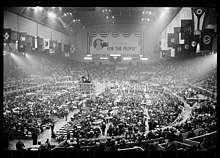
The Republican National Convention of 1964 was a tension-filled contest. Goldwater's conservatives were openly clashing with Rockefeller's moderates. Goldwater was regarded as the "conservatives' leading spokesman."[2] As a result, Goldwater was not as popular with the moderates and liberals of the Republican Party.[3][4] When Rockefeller attempted to deliver a speech, he was booed by the convention's conservative delegates, who regarded him as a member of the "eastern liberal establishment." Despite the infighting, Goldwater was easily nominated. He chose William E. Miller, a Representative from New York, as his running mate. In his acceptance speech, he declared communism as a "principal disturber of the peace in the world today" and said, "I would remind you that extremism in the defense of liberty is no vice. And let me remind you also that moderation in the pursuit of justice is no virtue." Some people, including those within his own campaign staff, believed this weakened Goldwater's chances, as he effectively severed ties with the moderates and liberals of the Republican Party.[5]
Former vice president and GOP presidential nominee (and future President) Richard Nixon introduced the Arizonan as "Mr. Conservative" and "Mr. Republican" and he continued that "he is the man who, after the greatest campaign in history, will be Mr. President — Barry Goldwater".[6]
According to Emmy award-winning television journalist, Belva Davis, she and another black reporter were chased out of the convention by attendees yelling racial slurs.[7]
Platform
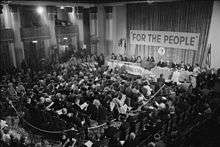
The 1964 Republican Platform was dominated by Goldwater conservatives, which meant the platform was dominated by calls for limited government, condemnations of the Kennedy and Johnson foreign and domestic policy, calls for more open space for free enterprise, a hard-line against Communist North Vietnam, calls for reform of the United Nations, a staunch support of NATO, calls for lower taxes, a hard line against international Communism, and an accusation that the Kennedy Administration was guilty of Munich-like appeasement for having opened a hotline with the Soviet Union and not with American allies.[8]
Candidates for the nomination

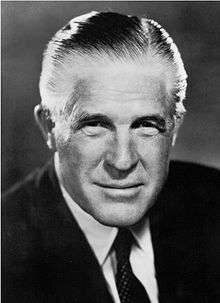


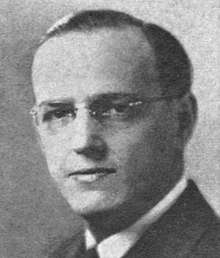
Former Representative
Walter Judd
from Minnesota.jpg)
Ambassador
Henry Cabot Lodge, Jr.
of Massachusetts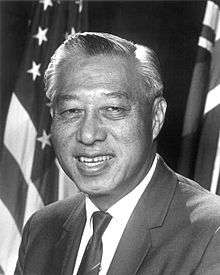
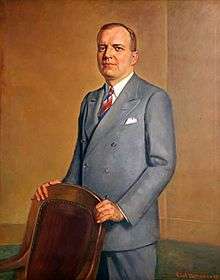
Former Governor
Harold Stassen
of Minnesota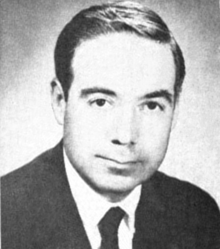
Governor
William Scranton
of Pennsylvania
Balloting
The roll call vote of the states was as follows, as reported by the New York Times:
| State | ||||||||
|---|---|---|---|---|---|---|---|---|
| Alabama | 20 | |||||||
| Alaska | 8 | 2 | 1 | 1 | ||||
| Arizona | 16 | |||||||
| Arkansas | 9 | 2 | 1 | |||||
| California | 86 | |||||||
| Colorado | 15 | 3 | ||||||
| Connecticut | 4 | 12 | ||||||
| Delaware | 7 | 5 | ||||||
| Florida | 32 | 2 | ||||||
| Georgia | 22 | 2 | ||||||
| Hawaii | 4 | 4 | ||||||
| Idaho | 14 | |||||||
| Illinois | 56 | 2 | ||||||
| Indiana | 21 | |||||||
| Iowa | 14 | 10 | ||||||
| Kansas | 18 | 1 | 1 | |||||
| Kentucky | 21 | 3 | ||||||
| Louisiana | 20 | |||||||
| Maine | 14 | |||||||
| Maryland | 6 | 13 | 1 | |||||
| Massachusetts | 5 | 26 | 1 | 2 | ||||
| Michigan | 8 | 40 | ||||||
| Minnesota | 8 | 18 | ||||||
| Mississippi | 13 | |||||||
| Missouri | 23 | 1 | ||||||
| Montana | 14 | |||||||
| Nebraska | 16 | |||||||
| Nevada | 6 | |||||||
| New Hampshire | 14 | |||||||
| New Jersey | 20 | 20 | ||||||
| New Mexico | 14 | |||||||
| New York | 5 | 87 | ||||||
| North Carolina | 26 | |||||||
| North Dakota | 7 | 1 | 3 | 3 | ||||
| Ohio | 57 | 1 | ||||||
| Oklahoma | 22 | |||||||
| Oregon | 18 | |||||||
| Pennsylvania | 4 | 60 | ||||||
| Rhode Island | 3 | 11 | ||||||
| South Carolina | 16 | |||||||
| South Dakota | 12 | 2 | ||||||
| Tennessee | 28 | |||||||
| Texas | 56 | |||||||
| Utah | 14 | |||||||
| Vermont | 3 | 2 | 2 | 5 | ||||
| Virginia | 29 | 1 | ||||||
| Washington | 22 | 1 | 1 | |||||
| West Virginia | 10 | 2 | 2 | |||||
| Wisconsin | 30 | |||||||
| Wyoming | 12 | |||||||
| District of Columbia | 4 | 5 | ||||||
| Puerto Rico | 5 | |||||||
| U.S. Virgin Islands | 3 | |||||||
| Total | 883 | 214 | 114 | 41 | 27 | 22 | 5 | 2 |
Presidential
- Barry Goldwater 883
- William Scranton 214
- Nelson Rockefeller 114
- George Romney 41
- Margaret Chase Smith 27
- Walter Judd 22
- Hiram Fong 5
- Henry Cabot Lodge, Jr. 2
Vice Presidential
William E. Miller, a Representative from Western New York who had served as Chairman of the Republican National Committee since 1961, was nominated unanimously on a roll call vote. Goldwater stated that he chose Miller to be his running mate simply because "he drives Johnson nuts" with his Republican activism.[9] But by some other accounts, Johnson "was barely aware of Miller's existence." Miller's Eastern roots and Catholic faith balanced the ticket in some ways, however ideologically he was conservative like Goldwater. His relative obscurity—"he was better known for snipes at President Kennedy than for anything else"—gave birth to the refrain "Here's a riddle, it's a killer / Who the hell is William Miller?"[9]
He was replaced as Chairman of the RNC by Dean Burch, a Goldwater loyalist from Arizona.
See also
- History of the United States Republican Party
- List of Republican National Conventions
- U.S. presidential nomination convention
- 1964 Democratic National Convention
- 1964 United States presidential election
- Barry Goldwater presidential campaign, 1964
References
- Shadegg, Stephen (1965). What Happened to Goldwater? The Inside Story of the 1964 Republican Campaign. NY: Holt, Rinehart and Winston. p. 134.
- The New York Times Election Handbook 1964. New York: McGraw Hill. 1964. p. 65.
- Epstein, Leon D.; Ranney, Austin (1966). "Who Voted for Goldwater: The Wisconsin Case". Political Science Quarterly. 81 (1): 82–94 [p. 85]. JSTOR 2146862.
- Mattar, Edward Paul (1964). Barry Goldwater: A Political Indictment. Minneapolis: Century Twenty One Unlimited. pp. 84–7.
- White, Clifton F. (1967). Suite 3505: The Story of the Draft Goldwater Movement. New Rochelle: Arlington House. p. 15.
- Conservatives Re-Take the R... on YouTube
- Rutland, Ginger (February 19, 2012). "The Reading Rack". Sacramento Bee. p. E3. Archived from the original on February 1, 2013. Retrieved November 14, 2012.
- "Republican Party Platforms: Republican Party Platform of 1964". www.presidency.ucsb.edu. Retrieved 1 April 2018.
- Perlstein, Rick (2002). Before the Storm: Barry Goldwater and the Unmaking of the American Consensus. p. 389 – via Google Books.
External links
| Wikimedia Commons has media related to 1964 Republican National Convention. |
- Republican Party platform of 1964 at The American Presidency Project
- Goldwater nomination acceptance speech for President at RNC (transcript) at The American Presidency Project
- 1964 Republican National Convention at Smithsonian Magazine
- Video of Goldwater nomination acceptance speech for President at RNC from C-SPAN (via YouTube)
- Audio of Goldwater nomination acceptance speech for President at RNC
- Video of Miller nomination acceptance speech for Vice President at RNC from C-SPAN (via YouTube)
| Preceded by 1960 Chicago, Illinois |
Republican National Conventions | Succeeded by 1968 Miami Beach, Florida |